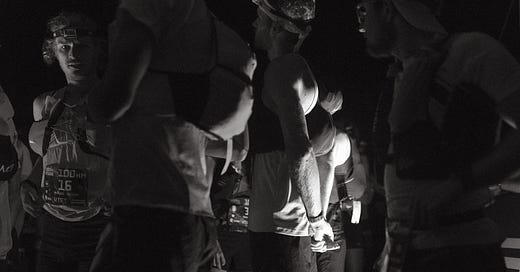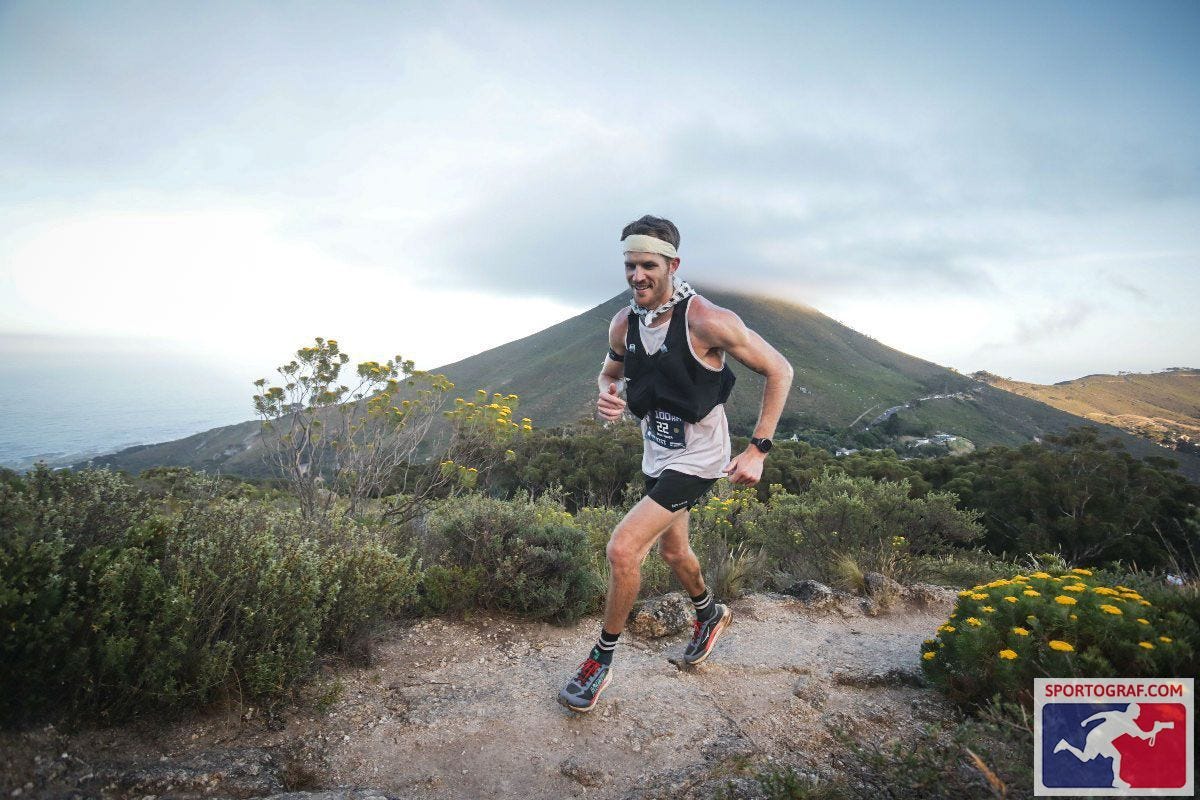Riding the DNF waves in Cape Town
Post-mortem on the UT100 and lessons learned heading into 2025
About 5k out from the Hout Bay aid station, 50k and 10k ft of climbing into the Ultra Trail Cape Town 100k (UT100), I started to descend on what should have been the sweet reprieve of soft runnable trail towards the beach. The trail was indeed soft with a nice downhill pitch, a welcome change from the consistent technicality of the previous 30k, but my body struggled to keep things below 9:30/mile pace. In response, I gave myself permission to call my race over.
Ultimately, what did me in wasn’t the full-body cramps, heat, humidity, wavering confidence from competition blowing by me, or the lack of energy reserves from no sleep the previous night – it was the pressure I put on myself and the decision (maybe call it more of a flight or fight reaction) around 25k to start pushing hard and race for a top 10 position, in spite of all those conditions.
When we fall short in life, we can lean on excuses, or we can learn from and accept the reasons why.
Now, I certainly don’t want this to be a melodramatically self-critical post, or your standard indulgent DNF story. We’ve all not finished something and been hard on ourselves or regretted it after the fact.
I simply hope to share a little gratitude and lessons learned, both for myself and you all reading to keep with you in the future (whether it applies to running or another area of life).
Gratitude
Before we met, my partner/fiancé spent a few years post college living and working between Botswana and South Africa. If it wasn’t for the existence and allure of the Ultra Trail Cape Town race, I would not be sitting in Gaborone starting to write this reflection after spending a memorable week in Cape Town. Getting to see a glimpse of a chapter of her life I otherwise wouldn’t be privy to. (also getting quite pumped to take a bush plane to a safari camp in the Okavango Delta tomorrow)
And, had she not taken the risk of moving out here years ago, I likely would not have circled UTCT as a realistic race to run. Experiencing the magical trail culture and community, while also seeing the permanent effects of apartheid and how parallel it feels to social and economic dynamics in the US.
To put a cherry on it all, I also got to beat my body up over 40 miles of the most masochistically technical yet stunningly beautiful trails you could imagine. Encountering so many friendly and supportive fans and volunteers along the way.
Lessons Learned
Ultimately, this DNF feels a bit like a release from the pressure I put on myself, but I also gained a lot of tactical wisdom.
Process Over Outcomes
At times this summer and fall, I got really bogged down in worrying about results. This drove my dedication to training, making it feel like a self-created obligation instead of the privilege and joy that is spending lots of hours each week on trails. Leading up to the race, I put together a few quality weeks as my iron levels increased and a few nagging injuries improved, but my anxiety around the kind of outcome I was capable of in Cape Town clouded everything.
To be completely honest, finishing races well, getting my name out there, and maybe snagging some free gear, was a motivator of mine when setting goals for 2024. We all dream of extraordinary results. Training for an ultra is too time intensive and requires too much spirit for those ego-boosting outcomes to be what gets us out the door each day. Loving and being grateful to the process, every stride on the trail, each connection made, is a much more resilient motivator once the headwinds arrive.
Start Slow, Finish Hard
100k is a long distance to race (heck, so is 50k). Everyone seems to shoot out of a cannon these days, running those first few miles questionably fast considering the length and pace of the full race. Relatively speaking, I am decent at holding back at the beginning of a race. Even so, I need to start slower, almost painfully slow. Adrenaline and fresh legs will always carry you a bit quicker than you realize. Earn the right to race fast in the back half through running “slow” during those first miles.
This comes with the caveat that elites at the sharp end of the field have the talent and aerobic fitness to hold on to a hot initial effort when they’re having a good day. Even so, half of the runners who come through the first aid station in the top 10, won’t be there at the finish line.
It’s Never Too Early To Prepare
This especially applies when you are traveling to race. Feel a wave of motivation to research the course and get your pacing plus nutrition plan together a month ahead of time? Do it. Wanting to get started packing two weeks before your departure? Why not.
Ultimately, your time and effort in the days leading up to the race should be focused on resting, eating, and soaking up the event atmosphere. I used to like the ritual of getting everything planned and together the day before the race, but I’ve learned that is not the optimal way to approach it, especially given my clash of a procrastinating and detail oriented nature.
Let Your Crew Make Decisions For You (And Be Mean If They Have To)
Our brains trick us when we are hours into a race, sweating buckets, slurping down gels, pounding our bodies, overthinking everything.
Before the race, tell your crew your goals, what you need, and what to do if things go wrong. Personally, “harsh” motivation works on me when my brain is trying to rationalize. Yes, not finishing the race in Cape Town was an ok outcome. I was running off no sleep and apparently looked real bad at 55k. I was allowed to doink around for 30-45 minutes at the aid station though, and once I finally left to start hiking up the next hill, I was really only doing it out of respect for my crew and coach.
Reflecting back, things might have turned out differently had I told my partner that she could tell me I “looked like shit, slow down” at Llandlundo, or “you aren’t injured sit down, eat some potatoes and chug water, then get your ass going” at Hout Bay. This requires explicit permission from you before the race though, as it’s hard to be hard on someone when they’re clearly having a rough go 7 hours into a race.
Other DNF-Driven Thoughts
Live-tracking can be a tricky thing mentally if you are fading, knowing that your friends and family are following along rooting for you. Remind yourself that they are just impressed you’re doing this crazy thing in the first place, and just want you to finish/will love you regardless.
You can never do too much course recon. Youtube videos are helpful but getting on the real thing is ideal
If you’re traveling, try to arrange your schedule to allow time to enjoy pre-race festivities and to stick around for the awards ceremony
Keep everything as simple as humanly possible – especially when it comes to your kit and compulsory gear. Don’t obsess over optimizing every ounce or carb. Use what you have and follow the common-sense practice of just drinking/eating a lot
Remember that your preparedness and presence out there can help other racers – bring extra salt, fuel, and water to share
Creating a routine to help you sleep the nights before a race should be a top priority, test different strategies out ahead of time (i.e. sleep aids)
Be proud, be patient, have fun, and leave ego at the start line
Looking Ahead to Winter
Last year, I cooked myself after the Grand Traverse Triple Crown (in September, haha). I ran a bit in October and November but suffered a calf injury and ended up partying and drinking my way through December. It’s always good to have perspective and just a few days into this month things are already trending in the right direction.
My race and personal calendar is coming together for next year. In order to prepare, mentally and physically, this winter is going to be fun. Big days climbing in the backcountry on skis, quality uphill treadmill sessions, having fun looking like a gaper on skate skis, and getting on trails as winter allows with a bit of speed mixed in. My hope is to come out of the next few months with a deep sense of connection to the mountains and confidence in the aerobic strength I’ve accumulated along the way.






